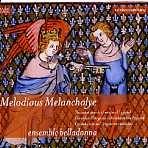This “tribute to the melodious melancholy of the English” successfully captures the mood and introspective atmosphere of these mostly anonymous songs, using both unaccompanied voices and instruments–harp, fiddle, and rebec–to enchant our ears and inform the period style. But apart from the very well-selected repertoire, which includes some truly exquisite “melodiously melancholy” tunes, the glory of this recording is the voices, whether in ensemble or solo. Two of the three women who make up Ensemble Belladonna sing, the third joins the others (who also play instruments) on fiddle and rebec.
The sound of the women’s voices may remind listeners of Anonymous 4 for its ideally-matched, exceptionally clear, perfectly-tuned quality–or of Trio Medieval for the same reasons–but the individuality also shines through, most memorably in the voice of whoever (the soloists aren’t credited) sings the classic “Bryd one breere” and “Plus penser que dire”. Now that is the essence of melancholy! Another highlight (besides the consistently tasteful, complementary instrumental playing) is the fetchingly sonorous, rhythmically catchy way the group performs the 15th-century song “Abide, I hope it be the best”. This is a real treat for early music fans, with fine sound to complete a first-class production.
































